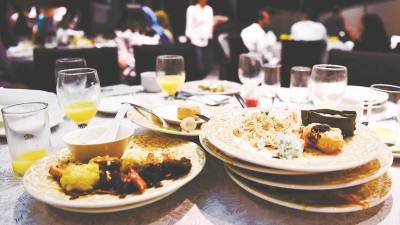IMAGINE stacking 3,500 Petronas Twin Towers by weight. That is how much food the world wasted in 2022: a staggering 1.05 billion tonnes.
In Malaysia, we throw away 17,000 tonnes of food every day, and almost a quarter of it is still edible. That is enough to feed three million people three meals a day even as households struggle with rising grocery bills.
Food waste is not just about tossing out leftovers; it is a triple threat to our economy, environment and food security. Globally, food waste accounts for 8% to 10% of greenhouse gas emissions. It also squanders the resources needed to produce, transport and prepare food – including land, water, energy and labour.
Households are largest food wasters
Many assume that hotels and buffets are the main culprits but food waste starts at home. A study by Universiti Kebangsaan Malaysia found that households contribute 38.2% of the country’s food waste – more than hotels, restaurants or markets. In comparison, wet and night markets account for 24.5%, food courts and restaurants 23.4% and hotels 6.9%.
Smarter shopping, mindful eating
Researchers from Universiti Putra Malaysia found that nearly half of all household food waste is due to spoilage and loss of freshness.
Simple habits like planning meals, buying only what is needed and repackaging bulk groceries into smaller portions can help reduce waste and save money.
Through World Vision Malaysia’s Eat Right to Play Right programme, we work with families in People’s Housing Programme communities to reduce food waste.
Parents learn to plan meals using the Malaysian Food Pyramid 2020, portion meals appropriately and store food safely. This helps cut waste and lower grocery bills.
Eating habits also play a role. Rice, noodles and vermicelli make up nearly 75% of plate waste while vegetables, which Malaysians already consume too little of, are often discarded.
The National Health and Morbidity Survey 2023 found that 95.1% of adults don’t consume enough fruits and vegetables, reflecting poor dietary habits and contributing to unnecessary food waste. One solution is to eat mindfully and stick to the recommended portions. This helps families save money and lower the risk of obesity and related health issues.
Sustainable food system
In a world of plenty, 673 million people still go to bed hungry – a stark reminder that hunger is not just about food production but also about poverty and access.
In Malaysia, organisations like The Lost Food Project, Food Aid Foundation and Yayasan Food Bank rescue surplus food from supermarkets, hotels and markets, redistributing it to vulnerable communities.
We can support their efforts through donations, volunteering or partnerships.
Reducing food waste is essential for building a sustainable food
system – one that ensures nutrition and food security for all without harming the economy, environment or social equity.
World Vision Malaysia’s experience shows that when families are equipped with the knowledge and skills to manage their food resources wisely, they can save money and redirect it towards essentials like education, helping to break the cycle of poverty.
Beyond the RM100 Sara aid
To help ease the cost of living, the government recently provided a one-off RM100 Sumbangan Asas Rahmah (Sara) payment to all individuals aged 18 and above.
While reactions to the RM100 aid were mixed, preventing food waste is key to making that amount stretch at least 25% further.
As we use our Sara aid, it is important to remember that preventing waste is just as valuable as bargain-hunting. Every ringgit saved by reducing waste is a ringgit earned for the family.
By shopping, cooking and eating responsibly, we not only nourish ourselves but also contribute to a more sustainable food system for Malaysia’s future.
Quick tips to stretch your RM100 and cut waste Plan before shopping – make a grocery list and stick to it.
Store smart – follow “first in, first out” and use proper storage methods.
Portion wisely – order smaller portions of rice or noodles when dining out and finish your vegetables.
Check expiration labels – “Use by” = safety; discard after this date. “Best before” = quality; if the food looks, smells and tastes fine, it is generally safe to eat.
Ang Zheng Feng is a health and nutrition officer with World Vision Malaysia. Comments: letters@thesundaily.com
